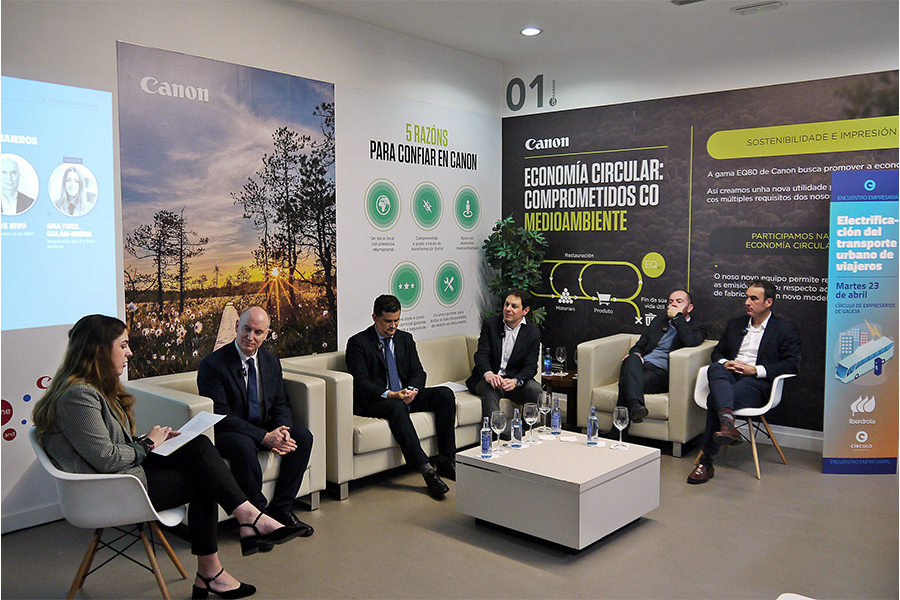Iberdrola España and the Círculo de Empresarios de Galicia hold conferences to promote electric mobility in northern Spain
- The company and the business entity held this morning in Vigo a conference to analyse the different solutions for reducing emissions thanks to the supply of renewable energies.
- The transport sector is responsible for almost a quarter of Europe's greenhouse gas emissions.

Iberdrola España and the Círculo de Empresarios de Galicia held this morning in Vigo the conference "Electrification of Urban Passenger Transport". This session addressed the different solutions that exist today to reduce carbon emissions thanks to the supply of 100% renewable energy with guarantee of origin. The objective is to achieve more sustainable cities and advance in the decarbonisation of transport.
The meeting was attended by companies from the sector, manufacturers, public administration officials, as well as the Iberdrola España Delegate in Galicia, Francisco Silva Castaño, the e-Bus and e-Truck Product Manager of the electricity company, Ana Fernández Galán-Miera, and the coordinator of the Energy and Environment Forum of the Círculo de Empresarios, Marcelino Otero.
The transport sector is responsible for almost a quarter of greenhouse gas emissions in Europe. Each combustion bus emits between 60 and 70 tonnes of CO2 through its exhaust, without taking into account micro-particles, which are highly harmful to health, or emissions of hydrocarbons (HC) and Volatile Organic Compounds (VOC).
100% renewable technology
Among all the existing and proposed mobility technologies for urban buses, 100% electric is the one that allows the total reduction of global and local emissions with maximum reliability, safety and comfort, while ensuring that the targets for the use of renewable are met. Iberdrola's España Delegate in Galicia highlighted that ‘moving towards the electrification of transport means moving towards a greener and more sustainable world. We can say that there are many cities using electric means of transport, and Galicia is not far behind’. Furthermore, Silva Castaño stressed that the electric bus ‘avoids importing fossil fuels and improves energy independence and security of supply. It is the only technology that allows both the total reduction of local emissions and maximum energy efficiency at a lower cost’.
The business meeting served to explore what companies in the urban passenger transport sector and administrations are developing to reduce emissions in cities and gain competitiveness in Galicia. To this end, they analysed how renewable energies can be used to decarbonise their processes, thus reducing their energy costs. Círculo de Empresarios wanted to convey the importance of advancing electrification as a clean, economical and efficient solution. Marcelino Otero pointed out that ‘the driver of the economy is energy and energy consumption is fundamental. We are moving towards decarbonisation at the same time that renewables are increasing. Transport is certainly essential for a strong economy’.
Saving fuel
The conference, which was held at the headquarters of Círculo de Empresarios, included a panel on success stories about the transition to electric mobility and its advantages. Ana Fernández Galán-Miera, e-Bus and e-Trucks Product Manager at Iberdrola, moderated the round table in which entrepreneurs from the sector took part. Galán-Miera stressed that electric buses, in addition to being more sustainable, are more competitive than fossil-fuelled buses. Although the initial investment is higher, the savings of up to 70% in fuel costs and 30% in maintenance mean that the total life-cycle cost of an electric bus is lower. Along the same lines, electricity supply costs provide greater stability in operating plans, as they offer the possibility of carrying out contracts for specific periods of time, with very competitive and advantageous prices compared to the fossil fuel option. In addition to these benefits, the greater comfort of these vehicles should also be added, as they are less noisy and less prone to vibration.
With a target date of net-zero emissions by 2050-2060, sustainable mobility will be a global necessity and Galicia is no exception. The conference was closed by Ana Mejías, Councillor for Cleanliness, Water Cycle and Transport of the City Council of Vigo.
